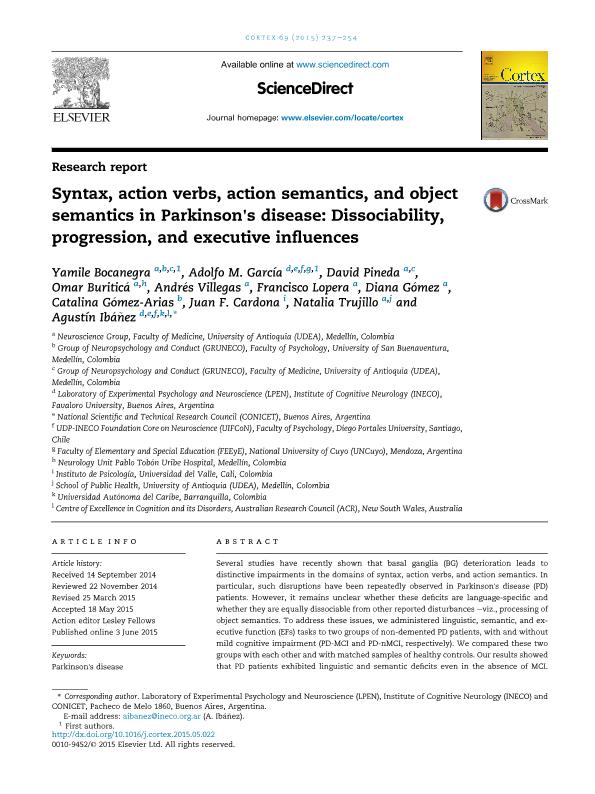Mostrar el registro sencillo del ítem
dc.contributor.author
Bocanegra, Yamile
dc.contributor.author
García, Adolfo Martín

dc.contributor.author
Pineda, David
dc.contributor.author
Buriticá, Omar
dc.contributor.author
Villegas, Andrés
dc.contributor.author
Lopera, Francisco
dc.contributor.author
Gómez, Diana
dc.contributor.author
Gómez Arias, Catalina
dc.contributor.author
Cardona Londoño, Juan Felipe

dc.contributor.author
Trujillo, Natalia
dc.contributor.author
Ibañez, Agustin Mariano

dc.date.available
2020-02-27T18:21:35Z
dc.date.issued
2015-08
dc.identifier.citation
Bocanegra, Yamile; García, Adolfo Martín; Pineda, David; Buriticá, Omar; Villegas, Andrés; et al.; Syntax, action verbs, action semantics, and object semantics in Parkinson's disease: Dissociability, progression, and executive influences; Elsevier Masson; Cortex; 69; 8-2015; 237-254
dc.identifier.issn
0010-9452
dc.identifier.uri
http://hdl.handle.net/11336/98520
dc.description.abstract
Several studies have recently shown that basal ganglia (BG) deterioration leads to distinctive impairments in the domains of syntax, action verbs, and action semantics. In particular, such disruptions have been repeatedly observed in Parkinson's disease (PD) patients. However, it remains unclear whether these deficits are language-specific and whether they are equally dissociable from other reported disturbances -viz., processing of object semantics. To address these issues, we administered linguistic, semantic, and executive function (EFs) tasks to two groups of non-demented PD patients, with and without mild cognitive impairment (PD-MCI and PD-nMCI, respectively). We compared these two groups with each other and with matched samples of healthy controls. Our results showed that PD patients exhibited linguistic and semantic deficits even in the absence of MCI. However, not all domains were equally related to EFs and MCI across samples. Whereas EFs predicted disturbances of syntax and object semantics in both PD-nMCI and PD-MCI, they had no impact on action-verb and action-semantic impairments in either group. Critically, patients showed disruptions of action-verb production and action semantics in the absence of MCI and without any executive influence, suggesting a sui generis deficit present since early stages of the disease. These findings indicate that varied language domains are differentially related to the BG, contradicting popular approaches to neurolinguistics.
dc.format
application/pdf
dc.language.iso
eng
dc.publisher
Elsevier Masson

dc.rights
info:eu-repo/semantics/openAccess
dc.rights.uri
https://creativecommons.org/licenses/by-nc-nd/2.5/ar/
dc.subject
ACTION SEMANTICS
dc.subject
ACTION VERBS
dc.subject
EXECUTIVE FUNCTIONS
dc.subject
MILD COGNITIVE IMPAIRMENT
dc.subject
OBJECT SEMANTICS
dc.subject
PARKINSON'S DISEASE
dc.subject
SYNTAX
dc.subject.classification
Lingüística

dc.subject.classification
Lengua y Literatura

dc.subject.classification
HUMANIDADES

dc.subject.classification
Psicología especial

dc.subject.classification
Psicología

dc.subject.classification
CIENCIAS SOCIALES

dc.title
Syntax, action verbs, action semantics, and object semantics in Parkinson's disease: Dissociability, progression, and executive influences
dc.type
info:eu-repo/semantics/article
dc.type
info:ar-repo/semantics/artículo
dc.type
info:eu-repo/semantics/publishedVersion
dc.date.updated
2020-02-26T15:03:57Z
dc.journal.volume
69
dc.journal.pagination
237-254
dc.journal.pais
Francia

dc.journal.ciudad
Paris
dc.description.fil
Fil: Bocanegra, Yamile. Universidad de San Buenaventura; Colombia. Universidad de Antioquia; Colombia
dc.description.fil
Fil: García, Adolfo Martín. Universidad Diego Portales; Chile. Instituto de Neurología Cognitiva. Laboratorio de Psicología Experimental y Neurociencia; Argentina. Universidad Nacional de Cuyo. Facultad de Educación Elemental y Especial; Argentina. Consejo Nacional de Investigaciones Científicas y Técnicas; Argentina
dc.description.fil
Fil: Pineda, David. Universidad de Antioquia; Colombia
dc.description.fil
Fil: Buriticá, Omar. Universidad de Antioquia; Colombia. Hospital Pablo Tobón Uribe; Colombia
dc.description.fil
Fil: Villegas, Andrés. Universidad de Antioquia; Colombia
dc.description.fil
Fil: Lopera, Francisco. Universidad de Antioquia; Colombia
dc.description.fil
Fil: Gómez, Diana. Universidad de Antioquia; Colombia
dc.description.fil
Fil: Gómez Arias, Catalina. Universidad de San Buenaventura; Colombia
dc.description.fil
Fil: Cardona Londoño, Juan Felipe. Consejo Nacional de Investigaciones Científicas y Técnicas; Argentina. Universidad del Valle; Colombia
dc.description.fil
Fil: Trujillo, Natalia. Universidad de Antioquia; Colombia
dc.description.fil
Fil: Ibáñez Barassi, Agustín Mariano. Universidad Autónoma Del Caribe; Colombia. Universidad Diego Portales; Chile. Instituto de Neurología Cognitiva. Laboratorio de Psicología Experimental y Neurociencia; Argentina. Consejo Nacional de Investigaciones Científicas y Técnicas; Argentina. Universidad de Antioquia; Colombia
dc.journal.title
Cortex

dc.relation.alternativeid
info:eu-repo/semantics/altIdentifier/url/http://www.sciencedirect.com/science/article/pii/S0010945215001811
dc.relation.alternativeid
info:eu-repo/semantics/altIdentifier/doi/http://dx.doi.org/10.1016/j.cortex.2015.05.022
Archivos asociados
